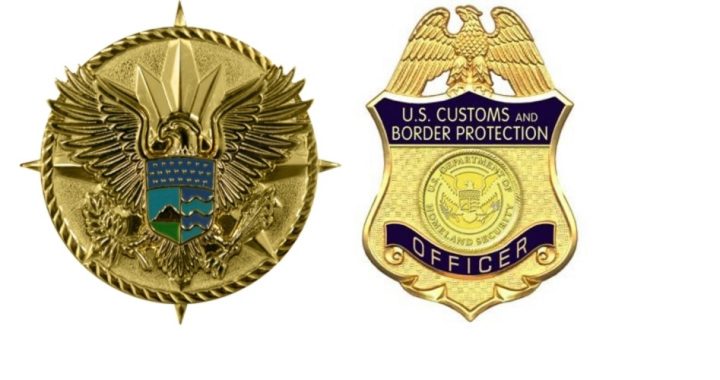
“Security” may be part of its name, but the Department of Homeland Security (DHS) isn’t exactly doing a bang-up job of securing its own property. According to a DHS inventory obtained by the website Complete Colorado, over 1,300 badges and credentials, 165 firearms, 360 computers, and 589 cellphones belonging to DHS sub-agencies were lost or stolen between October 2012 and April 2015.
“Almost 900 of the 1,300 lost or stolen badges or credentials were from the sub-agency Customs and Border Protection (CBP); about 300 were under the responsibility of Immigration and Customs Enforcement (ICE), and approximately 200 were responsible to U.S. Citizenship and Immigration Services (USCIS),” reported Complete Colorado, which obtained a spreadsheet of lost, damaged, and destroyed DHS property via a Freedom of Information Act request.
In other words, the potential exists that terrorists or other ne’er-do-wells could be posing as government agents, using authentic credentials that make them extremely difficult to detect.
“It’s scary that you’d have that number of credentials out there that someone could manipulate,” retired Secret Service special agent Tim Miller told Fox News.
“The thing that’s particularly concerning is that if you get real credentials, it’s very easy to manipulate them, and you’ve got someone else’s picture on what law enforcement would see as valid,” Miller said. “Then you factor in terrorism, it’s a significant concern that people would run around with authentic credentials and be able to access areas they wouldn’t otherwise be able to access.”
Former Homeland Security undersecretary and Federal Emergency Management Agency (FEMA) director Michael Brown also voiced unease over the badges and credentials, saying they were cause for an inspector general’s investigation.
“Law enforcement credentials, badges or ID cards can be used to access areas closed to the public, restricted access areas, and allow a person to pose as a law enforcement official where lax inspection of the credential to match it with the person carrying it allows that person entry to restricted areas,” Brown told Complete Colorado. “Possession of these kinds of credentials gives terrorists or criminals the basic information needed to counterfeit other credentials.”
This is not the first time concerns have been raised about missing DHS credentials. In December, the Senate Commerce, Science, and Transportation Committee approved a bill to tighten the Transportation Security Administration’s (TSA) employee-screening process and toughen the penalties related to lost credentials. “The legislation was put forward after members of the committee wrote to TSA officials in March expressing concern about reports of unaccounted TSA badges, and the reported use of badges to bypass security checkpoints,” wrote Fox News.
“When the Commerce Committee looked at lost and missing airport security credentials, we discovered that existing rules weren’t being effectively enforced,” committee chairman Sen. John Thune (R-S.D.) told Fox. “Mistakes happen, but if we don’t work to eliminate them and insist on accountability, then we’re left with unacceptable risk.”
Then there’s the matter of the 165 missing firearms. Of those, just under half were owned by CBP, with most of the rest owned by ICE and “a small handful” lost by TSA, according to Complete Colorado. The overwhelming majority of the guns — 132 — were reported stolen; but as the website points out, that number may be inaccurate “due to a common perception among officers that reporting a stolen firearm was more acceptable than reporting a lost firearm,” as a 2010 DHS inspector general’s report on missing firearms put it.
Although DHS declined to provide overall inventory numbers for comparison purposes, Complete Colorado noted that the 2010 report stated that DHS had issued over 188,000 firearms, meaning that the 165 lost or stolen ones could represent less than 0.1 percent of inventory. Moreover, given that the earlier report indicated that the department had lost 289 firearms over a three-year period, DHS may actually have improved its firearms controls.
DHS’ computer controls may also have gotten better. In fiscal year 2008 alone, the department lost nearly 1,000 computers; the latest inventory indicates a loss of “only” 360 computers over 31 months.
Complete Colorado sought comment from DHS on the latest spreadsheet of lost and stolen items, but the website said “the response did not provide meaningful answers to questions about the losses, or the potential for security problems as a result.”
Fox News fared a little better in obtaining a relevant response. “DHS did not dispute the inventory report data,” Fox reported, adding that “a DHS spokesman said they strive to be ‘good stewards of government resources’ and have improved oversight and reduced the number of lost or stolen items over the past few years.”
“If a credential holder loses or has their credentials stolen, the holder must report the incident to their supervisor and credential issuance office immediately,” spokesman Justin Greenberg said. “Once the incident has been reported, this information is entered into appropriate DHS and law enforcement databases, which disables use of the lost or stolen item.”
That doesn’t help, however, if the badge is only subjected to a visual inspection. Simply displaying a badge is often sufficient to enable an individual to enter restricted areas.
Greenberg also said that all mobile devices, laptops, and tablets are encrypted, so they probably would be of little immediate use to anyone finding or stealing them. Cellphones, assuming their disappearance is reported, can have their service terminated. But this is government, where things seldom happen at a rapid pace, regardless of their urgency.
And given how DHS secures its own property, just how good a job is it probably doing when it comes to securing the entire country?



